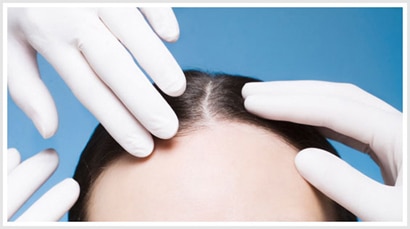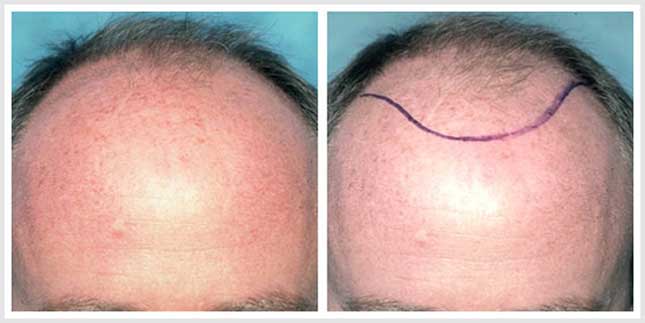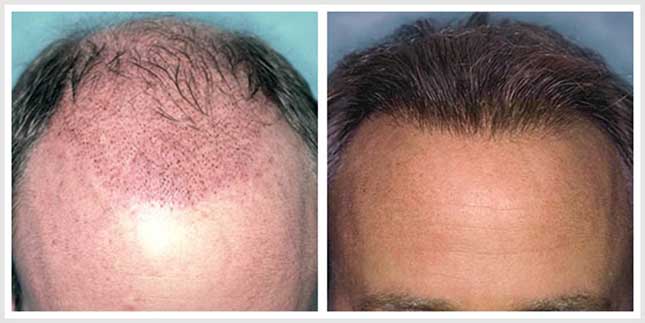 When it comes to understanding hair transplants and hair transplant surgery, transplanting a hair follicle is like transplanting a tree — you remove it from one place, plant it in a new place and it grows.
When it comes to understanding hair transplants and hair transplant surgery, transplanting a hair follicle is like transplanting a tree — you remove it from one place, plant it in a new place and it grows.
Hair is so emotional in our culture, explains California-based, board-certified hair transplant surgeon Dr. Sara Wasserbauer. “When the person in the mirror is not who you know, it can be so devastating. Men get teased, but for women — it’s a social stigma of sickness — you can get depressed and anti-social.” Judging by the amount of male celebrities who currently try to hide their hair loss dating back to Humphrey Bogart and John Wayne, it’s not as simple as just “buzzing it off” and getting on with your life.
If you’ve thought about life without all or parts of your hair and decided unequivocally that you want the hair back, hair transplant surgery is an option. “We can take the hair from where it is growing healthiest and simply move it to where it is not growing and the new healthy follicles will grow in the new spot, much like transplanting a bush or tree,” assures Wasserbauer. First, you’ll need to visit your doctor for a hair loss diagnosis to make sure your hair loss is not a medically progressive condition, and you’ll need healthy hair follicles, usually in the back of the head, to use for optimum results.
Is hair transplant surgery for me?
- Have you got a hair loss diagnosis?
- Do you have healthy hair growing in the back of your head?
- Can you afford a total cost of $7,000 to $10,000 dollars?
- Do you want the hair back permanently?
- Can you take a day off?
How does hair transplant surgery work?
Dr. Wasserbauer explains that each hair follicle is a unit containing 2-4 hairs. “We extract the healthy follicular units – each with its own stem cells that will regenerate and continue to grow when inserted to the new location. We can take a thin strip of tissue out and separate follicular units or take them out one by one. Either way they grow beautifully in their new location and it is successful and permanent almost 100% of the time.” By removing and transplanting individual follicular units one at a time, called Follicular Unit Extraction, you can expect the most natural-looking replacement while maintaining survival rates of each hair follicle.
What can I expect from hair transplant surgery?
It usually takes an entire day to complete the transplant depending upon how much of your hair is missing to begin with. A local anesthetic is prescribed so you won’t feel any pain in your scalp, much like going to the dentist. The first step is to separate all the follicular units, then the follicular units need to be transplanted right away. “It’s microsurgery done in a microscope and we do the whole thing in one day,” advises Wasserbauer. She also recommends gentle washing of the scalp the next day and every day to avoid the buildup of any crusting as the follicle heals. The new follicles will begin shedding in about three weeks and then become active as they enter the new stage of re-growth in about three to six months. The best part is that this process happens gradually, so the change is gradual too and not as noticeable as you might think.
One session is normally all it takes. However, The International Society of Hair Restoration Surgeons (ISHRS) advises that the number of sessions will depend on the area of scalp treated, the number and size of grafts used, and the density which you desire as well as the texture of your hair because coarse hair will look thicker than fine hair. “Two-thirds of my patients come back for more — simply because it is so successful that they want more hair!” says Wasserbauer.


Complications of hair transplant surgery
Infections in hair transplants are extremely rare — the scalp heals well because of the blood supply. The biggest problem with hair transplant surgery is getting ingrown hair as they begin to re-grow which is easily resolved by your doctor.
The bottom line on hair transplant surgery
The ISHRS advises that Hair Transplantation Surgery is more expensive than a nonsurgical hair system or some alternative treatments. However considering that the results are permanent, most people consider it a good investment in their future happiness. And the best part about it? “There’s no special care required — after all, it’s your own hair!” exclaims Wasserbauer.
Find a skilled hair transplant surgeon
Hair transplant surgery is a specialty requiring medical training, skill, and experience. Choose a specialist with an experienced team and ask the following questions:
- Member of The International Society of Hair Restoration Surgeons (ISHRS), the largest most well-respected hair restoration educational organization in the world?
- Certified by The American Board of Hair Restoration Surgery (ABHRS), the only certifying entity through a board exam that proves you are qualified?
- Experienced staff?
- Referrals to clients?
- Pictures of work?













